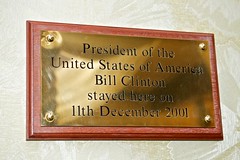Bill Clinton


Bill Clinton
(1946-present)
42nd President of the United States (1993-2001)
Commemorated on 4 plaques
Built in 1890 as quarters for navy officers, the Little White House later was used by American Presidents William Howard Taft, Harry S. Truman, Dwight Eisenhower, John F. Kennedy, Jimmy Carter and Bill Clinton. Truman used the facility as a vacation home and functioning White House between 1946 and 1952....
111 Front St, Key West, FL, United States where they stayed
President Bill Clinton. This sculpture was unveiled by Mr Charlie McReevy TD Minister for Finance on the 5th September 1998 to commemorate the golfing visit of the President of the United States of America to Ballybunion
Cnr Main Street and Church Road, Ballybunion, Ireland where they visited
President of the United States of America Bill Clinton stayed here on 11th December 2001
Mere Court Hotel, Warrington Road, Knutsford, United Kingdom where they was
Celebrated Guests. President William Jefferson Clinton Stayed Here 30th November, 1995.
Europa Hotel, Great Victoria Street, Belfast, United Kingdom where they stayed (1995)



